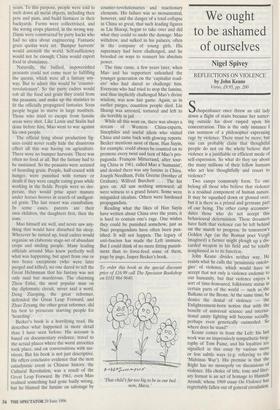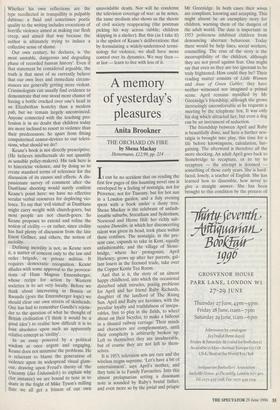We ought to be ashamed of ourselves
Nigel Spivey
REFLECTIONS ON VIOLENCE Schopenhauer once threw an old lady down a flight of stairs because her natter- ing outside his door rasped upon his concentration. This is the only instance I can summon of a philosopher expressing rage by violence. There must be more; but one can probably claim that thoughtful people do not on the whole believe that violence is a justifiable or efficient mode of self-expression. So what do they say about the many millions of their fellow humans who act less thoughtfully and resort to violence?
Two camps commonly form. To one belong all those who believe that violence is a residual component of human nature. It may be squashed down or glossed over, but it is there as a primal and germane part of our being. The other camp accommo- dates those who do not accept this behavioural determinism. These dreamers have faith that violence can be left behind on the march to progress. In tomorrow's Golden Age (as the Roman poet Vergil imagined) a farmer might plough up a dis- carded weapon in his field and be totally nonplussed as to its function.
John Keane divides neither way. He resists what he calls the 'pessimistic ontolo- gies' of violence, which would have us accept that not only is violence endemic to our humanity, but that violence enjoys a sort of time-honoured, folkloristic status in certain parts of the world — such as the Balkans or the Bronx. At the same time, he denies the denial of violence — the Enlightenment-born notion that with the benefit of universal science and interna- tional amity fighting will become socially, perhaps even genetically outmoded. So where does he stand?
Keane comes in from the Left: his last work was an impressively sympathetic biog- raphy of Tom Paine, and his loyalties are signalled in this essay by various more or less subtle ways (e.g. referring to the 'Malvinas War'). His premise is that the Right has no monopoly on discussions of violence. His choice of title, tone and liter- ary format is an act of homage to Hannah Arendt, whose 1969 essay On Violence has regrettably fallen out of general circulation. Whether his own reflections are the type recollected in tranquillity is palpably dubious: a fluid and sometimes poetic quality to the writing includes evocations of horrific violence aimed at making our flesh creep, and aimed that way because the author is ultimately trying to induce a collective sense of shame.
Our own century, he declares, is 'the most unstable, dangerous and degrading phase of recorded human history'. Even if that statement be considered arguable, the truth is that most of us currently believe that our own lives and immediate circum- stances are generally getting more violent. Criminologists can usually find evidence to demonstrate that one stood more chance of having a bottle cracked over one's head in an Elizabethan hostelry than a modern pub, but we remain largely unconvinced. Anyone connected with the teaching pro- fession is in no doubt that children today are more inclined to resort to violence than their predecessors. So apart from fitting computerised censor-devices to our televi- sions, what should we do?
Keane's book is not directly prescriptive. (He believes intellectuals do not quantify as sensible policy-makers). His task here is to historicise violence, and by doing so to create standard terms of reference for the discussion of its causes and effects. A dis- passionate survey of comment after the Dunblane shooting would surely confirm Keane's point here: we have no effective secular verbal resources for deploring vio- lence. To say that 'evil visited' at Dunblane might carry weight with church-goers, but most people are not church-goers. So Keane proposes to extend and refine the notion of civility — or rather, since civility has had plenty of discussion from the late Enest Gellner, and others, the notion of incivility.
Defining incivility is not, as Keane sees it, a matter of concern only to the law and order brigade, or private militias. It requires democratic recognition. Keane alludes with some approval to the provoca- tions of Hans Magnus Enzensberger, whose recipe for action by Western societies is to act very locally. Before we think about intervening in Bosnia or Rwanda (goes the Enzensberger logic) we should clear our own streets of skinheads. One has had to remember Gandhi's rejoin- der to the question of what he thought of British civilisation CI think it would be a good idea') to realise how difficult it is to foist absolutes upon such an apparently relative concept as 'civility'.
In an essay powered by a political wisdom at once urgent and engaging, Keane does not minimise the problems. He is reluctant to blame the generation of violence upon its widespread visual glam- our, drawing upon Freud's theory of 'the Uncanny (das Unheimlich) to explain why (for instance) we are bound to tune in to share in the fright of Mike Tyson's milling fists: we all get a frisson of our own unavoidable death. Nor will he condemn the television coverage of war: as he notes, the same medium also shows us the shoots of civil society reappearing (the postman picking his way across rubble; children skipping in a shelter). But this (as I take it) is the upshot of Keane's deliberations: that by formulating a widely-understood termi- nology for violence, we shall have more control over its dynamics. We may then at last — learn to live with less of it.



























































 Previous page
Previous page